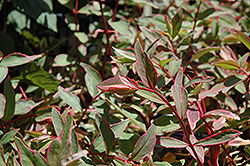Plant Library
Tricolor St. John's Wort*
Hypericum x moserianum 'Tricolor'
* This is a "special order" plant - contact store for details
Height: 30 inches
Spread: 3 feet
Sunlight:
![]()
![]()
Hardiness Zone: 7b
Other Names: Moser's Hybrid St. John's Wort
Description:
Radiant bright yellow buttercups flowers with bushy stamens adorn the green leaves with white variegation and a rosy glow, stems are also rosy pink; a phenomenal color accent for the garden; plants should be cut back in spring for best performance
Ornamental Features
Tricolor St. John's Wort has masses of beautiful yellow buttercup flowers at the ends of the branches from mid summer to mid fall, which are most effective when planted in groupings. The flowers are excellent for cutting. It has attractive white-variegated green foliage with hints of rose. The narrow leaves are highly ornamental but do not develop any appreciable fall colour. The pink stems can be quite attractive.
Landscape Attributes
Tricolor St. John's Wort is a multi-stemmed deciduous shrub with an upright spreading habit of growth. Its average texture blends into the landscape, but can be balanced by one or two finer or coarser trees or shrubs for an effective composition.
This shrub will require occasional maintenance and upkeep, and should only be pruned after flowering to avoid removing any of the current season's flowers. It has no significant negative characteristics.
Tricolor St. John's Wort is recommended for the following landscape applications;
- Mass Planting
- General Garden Use
- Groundcover
- Container Planting
Planting & Growing
Tricolor St. John's Wort will grow to be about 30 inches tall at maturity, with a spread of 3 feet. It tends to fill out right to the ground and therefore doesn't necessarily require facer plants in front. It grows at a medium rate, and under ideal conditions can be expected to live for approximately 5 years.
This shrub does best in full sun to partial shade. It is very adaptable to both dry and moist growing conditions, but will not tolerate any standing water. It is considered to be drought-tolerant, and thus makes an ideal choice for a low-water garden or xeriscape application. It is particular about its soil conditions, with a strong preference for rich, alkaline soils. It is highly tolerant of urban pollution and will even thrive in inner city environments. Consider applying a thick mulch around the root zone in winter to protect it in exposed locations or colder microclimates. This particular variety is an interspecific hybrid. It can be propagated by division; however, as a cultivated variety, be aware that it may be subject to certain restrictions or prohibitions on propagation.
Tricolor St. John's Wort makes a fine choice for the outdoor landscape, but it is also well-suited for use in outdoor pots and containers. With its upright habit of growth, it is best suited for use as a 'thriller' in the 'spiller-thriller-filler' container combination; plant it near the center of the pot, surrounded by smaller plants and those that spill over the edges. It is even sizeable enough that it can be grown alone in a suitable container. Note that when grown in a container, it may not perform exactly as indicated on the tag - this is to be expected. Also note that when growing plants in outdoor containers and baskets, they may require more frequent waterings than they would in the yard or garden. Be aware that in our climate, this plant may be too tender to survive the winter if left outdoors in a container. Contact our experts for more information on how to protect it over the winter months.
* This is a "special order" plant - contact store for details


